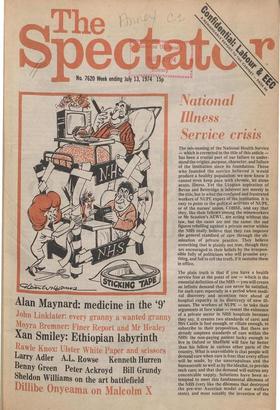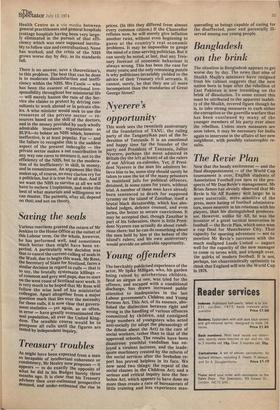National Illness Service crisis
The mis-naming of the National Health Service — which is corrected in the title of this article — has been a crucial part of our failure to understand the origins, purpose, character, and failure of the institution since its foundation. Those who founded the service believed it would produce a healthy population: we now know it cannot even keep pace with chronic, let alone acute, illness. Yet the Utopian aspiration of Bevan and Beveridge is inherent not merely in the title, but in what the confused and frustrated workers of NUPE expect of the institution. It is easy to point to the political activists of NUPE, or of the nurses' union, COHSE, and say that they, like their fellows among the mineworkers or Mr Scanlon's AEWU, are acting without the law, but the cases are not the same: the sad figures rebelling against a private sector within the NHS really believe that they can improve the general standard of care through the elimination of private practice. They believe something that is plainly not true, though they are encouraged in their beliefs by the irresponsible folly of politicians who will promise anything, and fail to tell the truth, if it sustains them in office.
The plain truth is that if you have a health service free at the point of use — which is the essential definition of the NHS — you will create an infinite demand that can never be satisfied, for such care; especially in a period when medical discovery and invention race ahead of hospital capacity in its discovery of new illnesses. The workers of NUPE — to take their arguments at face value — resent the existence of a private sector in NHS hospitals because,. they say, it creates two standards of care; and Mrs Castle is fool enough, or villain enough, to subscribe to their proposition. But there are already umpteen standards of care within the NHS: the non-paying patient lucky enough to live in Oxford or Sheffield will fare far better than his fellow in various other parts of the country. What is unavoidable is that people will demand care when care is free; that every effort will be made, by the unscrupulous and the bureaucratic as well as by the idealist, to provide such care; and that the demand will outrun any conceivable supply. Solutions have been attempted to meet this fundamental dilemma of the NHS (very like the dilemma that destroyed the pre-war Austrian model of our welfare state), and most notably the invention of the Health Centre as a via media between general practitioners and general hospitals (cottage hospitals having been very largely eliminated in the pursuit of that efficiency which was once supposed inevitably to follow size and centralisation). None has worked; and the crisis of the NHS grows worse day by day, as its standards fall.
There is no answer, save a theoretician's, to this problem. The best that can be done is to moderate dissatisfaction and inefficiency within the NHS. Mrs Castle — who has been the essence of emotional irresponsibility throughout her ministerial life — will merely hasten the ruin of the Service she claims to protect by driving consultants to work abroad or in private clinics. A wise minister would seek to use the resources of the private sector — resources based on the skill of the doctors, and in the money provided by such wholly admirable insurance organisations as BUPA—to bolster an NHS which, however, ineffective, is at least popular. For — and the failure to recognise this is the saddest aspect of the present imbroglio — the private sector makes a net contribution in any way one cares to measure it, not to the efficiency of the NHS, but to the moderation of its inefficiency: in skill, in money, and in commitment. An argument like this makes up, of course, no easy clarion cry for a politician, but it is true for all that. And if we want the NHS to survive at all we will have to eschew Utopianism, and make the best of what materials and willingness we can muster. The patients, after all, depend on that; and not on theory.
Saving the seals
Various reactions greeted the return of Mr Jenkins to the Home Office at the outset of this Labour term. On the whole, however, he has performed well, and sometimes much better than might have been expected. A particularly wise decision was that to cancel the current culling of seals in the Wash, due to begin this week. Mr Ross, the Secretary of State for Scotland, faces a similar decision in regard to culls — that is to say, the brutally systematic killings — of common and grey seal pups, due to start on the west coast of Scotland next week. It is very much to be hoped that Mr Ross will follow the wise lead of his ministerial colleague. Apart altogether from a major question mark that lies over the necessity for these culls, it is now clear that government statistics — yet again, as so often, in error — have greatly overestimated the seal population, all over the United Kingdom. The sensible course would be to postpone all culls until the figures are tested by independent inquiry.
Treasury troubles
As might have been expected from a man so incapable of intellectual coherence or consistency, Mr Healey now proposes — it appears — to do exactly the opposite of what he did in his Budget barely three months ago. It is clear that his Treasury advisers then over-estimated prospective demand, and under-estimated the rise in prices. (In this they differed from almost every common citizen.) If the Chancellor reflates now, he will merely give inflation another twist, without even beginning to guess at the country's real economic problems. It may be impossible to gauge the mind of a time-serving politician. But it can surely be noted, at last, that any Treasury forecast of economic behaviour is always wrong. This has been the case for many years; and the only remaining puzzle is why politicians invariably yielded to the advice of their Treasury civil servants. It cannot, surely, be that they are all more incompetent than the mandarins of Great George Street?
Nyerere 'S opportunity
This week sees the twentieth anniversary of the foundation of TANU, the ruling party of the Tanganyikan part of the federation of Tanzania. It is an emotional and happy time for the founder of the party and President of Tanzania, Julius Nyerere, perhaps the most admired in Britain (by the left at least) of all the rulers of our African ex-colonies. Yet, if President Nyerere is the man his admirers believe him to be, some step should surely be taken to ease the lot of the many prisoners in mainland jails for political offences, detained, in some cases for years, without trial. A number of these men have already been sentenced to death for supposed tyranny on the island of Zanzibar, itself a brutal black dictatorship, which has abolished judges, defence counsel, and even juries, the better to secure convictions. It may be accepted that, though Zanzibar is part of his federation, there is little President Nyerere can actually do about conditions there: but he can do something about the men held by him at the behest of the island's rulers; and his own anniversary would provide an admirable opportunity.
Young offenders
The inevitably publicised experience of the actor, Mr Spike Milligan, who, his garden being ruined by mischevious children, fired an airgun at one, was tried for the offence, and escaped with a conditional discharge, has drawn increased public attention to inadequacies in the last Labour government's Children and Young Persons Act. This Act, of its essence, abolished the distinction between right and wrong in the handling of various offences committed by children, and consigned large numbers of youngsters who acted anti-socially (to adopt the phraseology of the debate about the Act) to the care of social workers, rather than to that of the 'approved schools. The results have been disastrous: youthful vandalism has enjoyed a virulent increase, and the inadequate machinery created by the reform of the social services after the Seebohm report has proved helpless in its face. We now need two things: the repeal of the social clauses in the Children Act; and a serious and critical inquiry into the Seebohm Act, which appears to have done no more than create a race of bureaucrats of little training and less experience mas querading as beings capable of caring for the disaffected, poor and parentally illserved among our young people.
Bangladesh on the brink
The situation in Bangladesh appears to get worse day by day. The news that nine of Shaikh Mujib's ministers have resigned from his cabinet suggests that the new nation born in hope after the rebellion of East Pakistan is now trembling on the brink of dissolution. To some extent this must be attributed to the apparent inability of the Shaikh, revered figure though he is, to take strong measures to curb either the corruption or the guerrilla warfare that has been continued by many of the younger members of his party ever since the rebellion. Unless stern measures are soon taken, it may be necessary for India again to intervene in the affairs of her new neighbour, with possibly catastrophic results.
The Revie Plan
Now that the heady excitement — and the final disappointment — of the World Cup tournament is over, English students of Association Football can turn to the prospects of Mr Don Revie's management. Mr Brian James has already observed that Mr Revie is Sir Alf Ramsey writ large: he is more autocratic, more sensitive of the press, more hating of football administrators, more neurotic in his relations with his players, than his distinguished predecessor. However, unlike Sir Alf, he was the inventor of a great tactical innovation in football — the Revie Plan, which once won a cup final for Manchester City. That capacity for sporting adventure — not to mention Mr Revie's successes with the much maligned Leeds United — augurs well for the capacity of the new manager to come to terms with, and triumph over, the quirks of modern football. It is not, perhaps, too chauvinistically optimistic to think that England will win the World Cup in 1978.



































